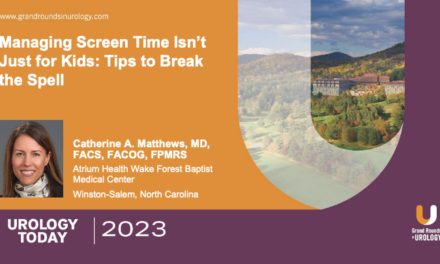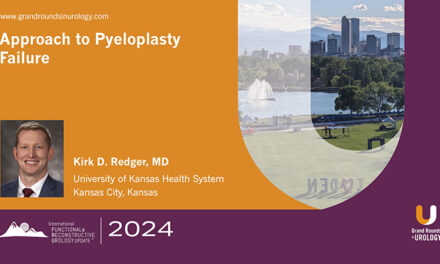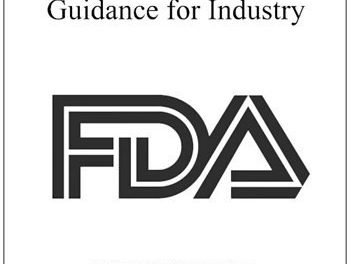Wesley A. Mayer, MD, presented “Mini Percutaneous Nephrolithotomy: Should We Find Space in Our Endourologic Toolbox?” at the 27th Annual Innovations in Urologic Practice conference on September 22nd, 2023.
How to cite: Mayer, Wesley A. “Mini Percutaneous Nephrolithotomy: Should We Find Space in Our Endourologic Toolbox?” September 2023. Accessed Jun 2025. https://grandroundsinurology.com/mini-percutaneous-nephrolithotomy-should-we-find-space-in-our-endourologic-toolbox/
Mini Percutaneous Nephrolithotomy: Should We Find Space in Our Endourologic Toolbox? – Summary
Wesley A. Mayer, MD, discusses miniaturized percutaneous nephrolithotomy (mPCNL). He explains procedures for dilating the tract, pointing out many sizes of metal dilators and sheaths available to surgeons. He covers the vortex effect, stent placement, and nerve block. Dr. Mayer then summarizes the American Urological Association (AUA)/ Endourological Society Guideline from 2016 for the surgical management of renal stones.
Dr. Mayer then compares mPCNL to standard PCNL (sPCNL) and retrograde ureteroscopy and proposes a framework for operative decision-making. Dr. Mayer examines mPCNL vs. sPCNL, whereby studies showed no difference in volume of damaged parenchyma or in systemic response to surgery-induced tissue trauma. He shares another study that showed higher average intrapelvic pressures using mPCNL, more time spent in the “danger zone” and greater dissemination of bacteria into other organs.
Dr. Mayer describes challenges in interpreting the literature, such as what qualifies as mPCNL, outcome metrics, follow up, imaging methods used, and what constitutes “stone-free.” He shares data illustrating that stone-free rates between mPCNL and sPCNL are comparable. The data also shows that transfusion risk favored mPCNL, as did length of hospital stay. However, operative time favored sPCNL. Dr. Mayer shares a retrospective review that indicated for larger stones, sPCNL was superior.
He compares mPCNL with ureteroscopy, finding that, while length of stay is longer with mPCNL, stone-free rates are similar. One comparison examined ultra-mini PCNL (umPCNL) and ureteroscopy, and indicated that umPCNL had favorable operative time, cost, complications, and stone-free rates. Dr. Mayer outlines the drawbacks of ureteroscopy before concluding by emphasizing that size matters and practitioners should choose wisely among various treatment procedures, including mPCNL and umPCNL.
About The 27th Annual Innovations in Urologic Practice:
Presented by co-chairs Mohit Khera, MD, MBA, MPH, and Michael Coburn, MD, FACS, the Innovations in Urologic Practice conference provides a detailed review and commentary on multiple genitourinary and urologic diseases. Among the featured oncological topics are bladder cancer and immunotherapies, as well as upper tract cancer management, prostate cancer, including state-of-the-art imaging, focal therapy, and MRI. Experts also discuss new tools and techniques for nephrectomy and treating advanced renal cell carcinoma. In terms of general urological approaches, the conference also includes pelvic reconstruction and trauma; men’s health topics like male infertility, andrology, and sexual dysfunction; OAB and voiding dysfunctions; and ways to diagnose and treat infections in the urology patient.
For further educational activities from this conference, visit our collection page.
ABOUT THE AUTHOR
Wesley A. Mayer, MD, is an associate professor of urology, the vice chair for education of the Scott Department of Urology, and an assistant dean of graduate medical education at Baylor College of Medicine in Houston, Texas. Dr. Mayer earned his medical degree from Baylor College of Medicine, graduating with highest honors. He completed his internship in general surgery and his urology residency at the University of Pennsylvania in Philadelphia, Pennsylvania. Dr. Mayer is fellowship-trained in advanced robotic, laparoscopic, and endoscopic surgery in Baylor College of Medicine’s Scott Department of Urology.
Dr. Mayer specializes in advanced minimally invasive surgical treatments for urologic diseases including robotic, laparoscopic (including single-site), endourologic, and percutaneous surgery. He has a special interest in kidney cancer, kidney stones, upper urinary tract reconstruction, adrenal masses, and transplant urology. He has also published research and has been invited to speak on these topics at several national and international conferences. Dr. Mayer has been repeatedly selected as a “Top Urologist in Houston, Texas” in The Leading Physicians of the World and a “Top Doc” in Houstonia Magazine.





